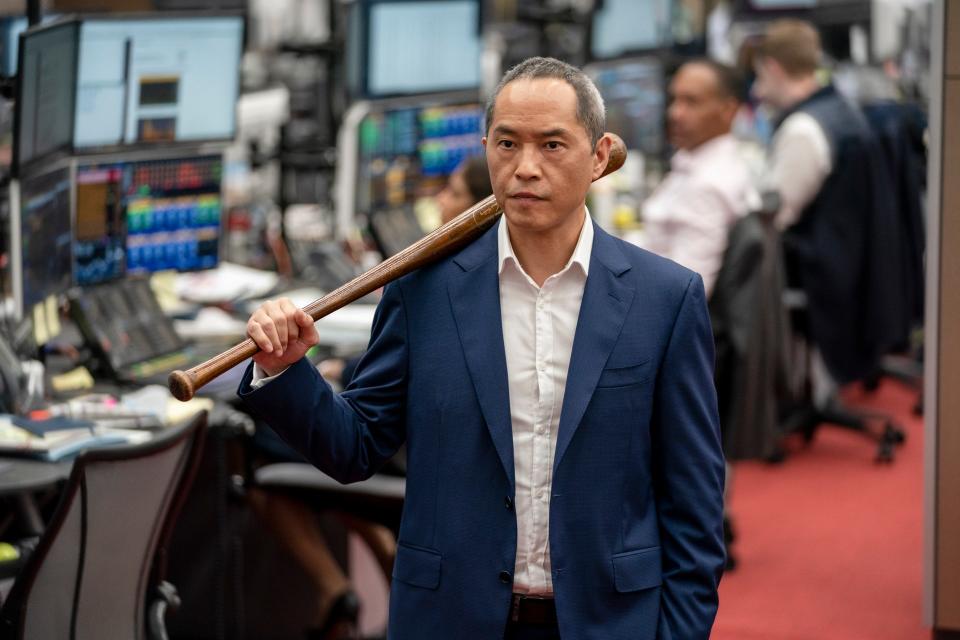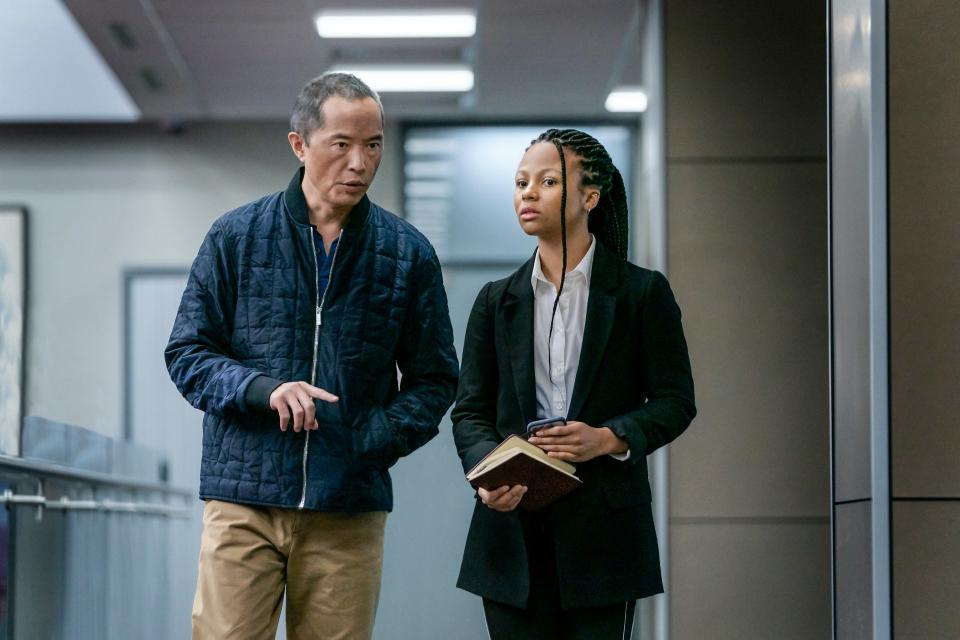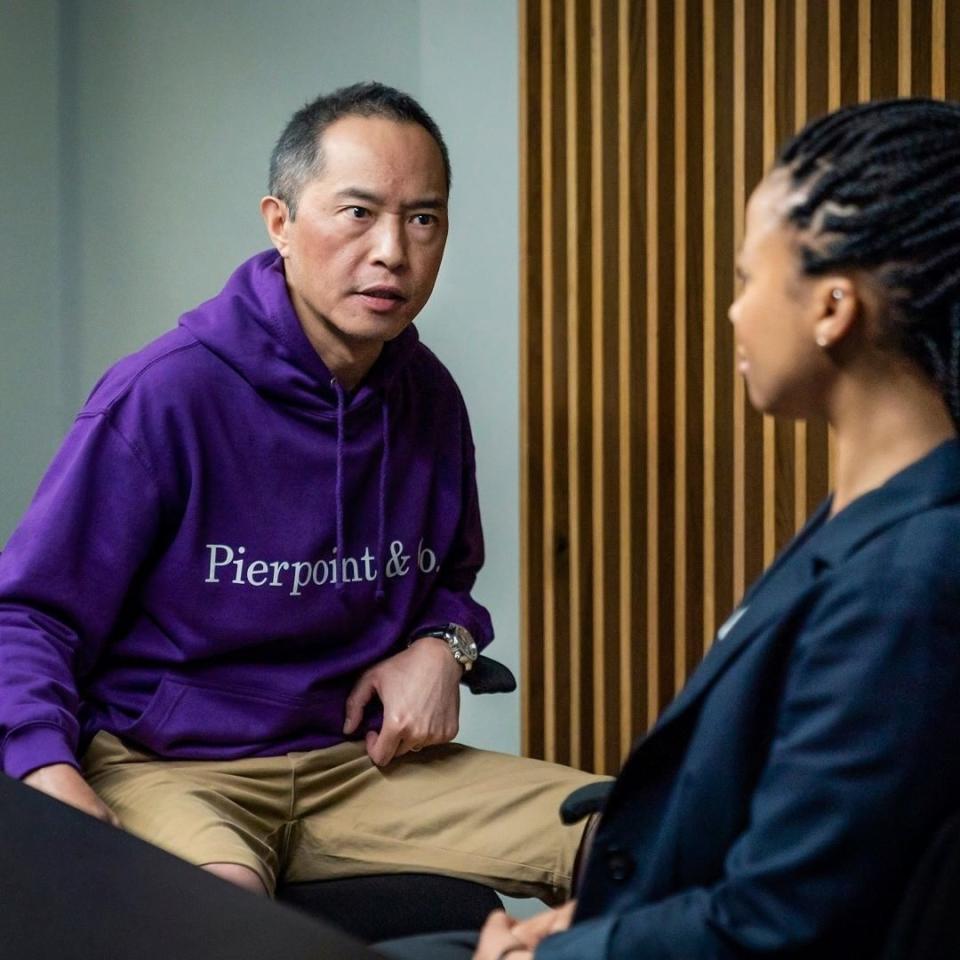Ken Leung on the Industry Finale, Working With Lena Dunham and Becoming the Veteran
- Oops!Something went wrong.Please try again later.
- Oops!Something went wrong.Please try again later.
Industry, HBO’s just-concluded BBC import, is full of unfamiliar faces. That’s by design: the series follows a group of graduates jockeying for full-time employment amidst the cutthroat, fast-paced world of finance and the four leads are all played by actors for whom this ranks as one of their first jobs. Every ensemble needs a totem, though—usually a recognizable character actor the audience has seen somewhere, if not everywhere, whose familiarity can either soothe or unsettle. On Industry, that figure is Ken Leung. Now 50 years old, the veteran actor has been stealing scenes since showing up as Juntao’s bottle-blonde henchman in Rush Hour in 1998. Since then, you’ve likely seen him play supporting but significant parts in everything from Lost and The Sopranos to X-Men: The Last Stand and The Force Awakens.
Leung has range: he can be the bad guy or the supportive sidekick, the unpredictable livewire or the calming presence. On Industry, his character Eric, a managing director at the show’s fictional bank Pierpoint, is all of those things at once, and sometimes even paternal—serving as both mentor and antagonist to Harper, the show’s ostensible protagonist. Now that the season is over and a second has been confirmed, GQ hopped on the phone with Leung to talk about the plot twists involving his character, being directed by Lena Dunham for the pilot, and his character’s now-infamous purple hoodie.

How did you come to join the show?
When it's pilot season, you get a bunch of projects, one after another, and this one struck me in that it's a rare thing to find a character that's written as an Asian-American character, who was as interesting as this character was. I was like, "It's so ironic that I have to go to the UK to find an Asian-American character worth playing." I understood the character right off the bat. I'm not a finance guy. I didn't know the lingo and stuff. But that didn't seem like the thrust of it, for me. He was coming from a place that he had a gravity about him that I was curious about.
And it was written such that you're like, "This is written from lived experience," in that you would never mistake a script from this show with any other show. It's a very specific type of writing, beyond the language. And when I met the two creators—one was a trader, one worked in mergers and acquisitions. Even if it's unfamiliar to you, they know intimately what they're talking about. So it created a safety net, where you could ask as many dumb questions as you needed to, and it gave a freedom to [the work].
And then add to that Lena Dunham, who had this very gentle hand. She created this environment where you felt free to just try things. Do a take just to try to make Lena laugh, or something. So that turned something that potentially was, "How am I going to wrap my head around this world that I know nothing about?" and made it fun.
Are interesting roles for Asian-American men something you feel like you don't come across enough?
Usually when I come across one, there's a reason. Otherwise it's not specified as Asian or Asian-American. You'll still have scripts where you have the menacing Asian gang boss, which, in and of itself, there's nothing wrong with that, but they're written all the same way. I swear I've said many of the same lines that I still come across in these scripts. This one, the only reason Eric is Asian-American is because he's based on a friend of Mickey and Konrad's that is Asian.
This is their first foray into screen stuff, so I think they just used as many pieces in their life as they could. So with Eric, it was somebody that they actually knew, it's just coincidental. He didn't have to be [Asian]. At least in season one, nothing's done with it. Maybe in season two, something will happen. I love the combination of him and Harper, the two outsiders, the only two Americans in this world.
And the only two Americans minorities, at that.
I forget where I heard this. It might've been from just a friend years ago. It always stuck with me. But it was, that Asian man and black woman are the best couple, best combination, because they're similarly marginalized. And I thought that was interesting. Obviously I was thinking of that during this.
I've been seeing you in TV and movies since going back to Rush Hour. But this feels like a totally different type of role. Eric’s interesting because he’s never just one thing. He can be incredibly protective in one instance and grossly manipulative in another.
I've never felt the way I felt in this type of role. I think part of that is that [the story] starts off really well. It starts off with him in trouble. There's a culture change at the company that is just starting, which is, "We have a new president." And she has this idea of just turning this company into, "We're all a team! We're stronger if we work together," when it just goes totally against Eric's old-school, world domination mind set. So he's threatened right from the get-go. The ground he's standing on is uncertain. He's never sure what's going to happen. So I think that contributes to watching him. Is he going to be hard on Harper in this? Is he going to try to get her, use her, et cetera, et cetera. It all comes from him being in danger as the season goes on.

Talk about the relationship that you built up with Myha'la Herrold. The show depends on you guys having good chemistry.
She's fantastic. I mean, from the first moment, it was as if we'd known each other already. I think we had anticipated meeting each other for so long that when we finally met, it was… she's just very easy to be with. It was her first time out of the US, I think. And she's a recent drama school graduate, so everything was new to her. She was up for anything and was very receptive to ideas and super fun to play with. Talking about Rush Hour, one of the things that I've never felt before in this is that I was suddenly kind of the veteran. It was like, "When did this happen?" You turn around and suddenly you're the oldest in the cast. In our first conversation, Lena prepared me for that. "Okay. You're the veteran. They're all out of drama school, so maybe they'll be looking to you in a way."
Knowing that going into a situation does something to you. It activates something, like you know that you're going to be setting examples, or you know that people are going to be paying attention to you in a certain way that just makes you take it seriously in a way that is different [than before].
There's a certain responsibility.
Exactly. There's a certain responsibility. Maybe it's just perceived responsibility, but whatever it is, since it was one of the first things that Lena told me, I had that going in. I was equally open, and I was like, "Okay. We're in this together." Our friendship, obviously, has sustained all this time.
Let's stay with Lena for a second. She really established a great tone and rhythm for the show in the pilot, which I think is a big reason for why the show caught on so quickly—it feels fully formed from the outset.
Yeah, I agree. As far as that goes, because my role occupies such a specific corner in the show, most of the show I'm just not privy to. So watching it, I'm experiencing it as objectively as I can as somebody who's also in it. There's an element that anything can happen at any time. I'm not schooled in these British shows, but there seems to be a different feel, different pace. Colors are different. It oddly reminds me of the '70s. By that, I mean there's a nostalgic thing to it I can't quite put my finger on. But I love it.
As far as working with Lena, it's almost like you're at camp. You're not so conscious that it's a big TV show. She creates this kind of team. We do silly warm-ups together to warm up. And then she lets us ad-lib, try things, make mistakes. She was very conscious that because everyone was a recent grad, that they needed to be supported in a way that maybe people who've been in it for their whole lives don't need. And it just created a very supportive environment.
I don't know if you know this, but you are the center of one of the show's most talked-about moments. Everyone is talking about the purple hoodie.
[laughs] I didn't realize that. What are they saying about it?
Well, people want it. They want it as merch.
That’s funny. I had no idea.

But what strikes me as hilarious about that scene is that—we were talking about the specific corner that Eric occupies, right? So we're only used to seeing your character in one way. And because of what's going on in that episode [where Eric is on thin ice at the company, depending on Harper to save him] it just struck me as so funny that a simple hoodie in that loud color, in that context, can symbolize such disarray going on in your life.
Right. Suddenly looking [out of sorts]. That's cool. I didn't realize what people were saying about it.
Jokes aside, that's an intense scene.
That was an interesting scene. Here's an example of me and Myha'la and our working relationship. Myha'la the person—not the actress or the character—she doesn't respond when people just yell at her. She shuts down. These are her own words. She withdraws. She doesn't fight back. She doesn't feel even bad. She just shuts down. So it didn't really work with Eric just yelling at her. And after a couple of takes of that scene, where I'm just yelling at her, we were like, "Okay, something's not working." And she suggested, "Why don't you just talk to me? We have a relationship such that if you, Ken, were sincerely upset with me, I would really feel bad." So we tried that. And it was such an easy fix. And it made the scene deeper.
Sometimes you read a scene on paper, and you're like, "Okay. I'm yelling at her." Then it just kind of floats to the surface. But if you take away what it looks like on the surface, and you just really try to communicate something to the person in front of you, it has a chance of different colors showing up. That happened with that scene. And that came from our comfort with each other, her wherewithal to suggest that, knowing how she works. It’s a sign of great maturity for an actor, especially an early actor, to know how you are, and what works, and what activates this and that
Going from that scene to what eventually happens to your character, then to the finale, it left me trying to figure out the true nature of that relationship. What was your perspective on the ending and where Harper and Eric end up? It sort of feels like she is circling back to someone who was manipulative and destructive, but I also took it as a happy ending, for lack of a better word.
I found it kind of touching—like, "Oh, they found each other again.” They were making friends, something collapsed, and now they found each other again. Now, the thing about how it ends is that I feel like, in the elevator, when she says, "Put the phone away..." The tables are kind of starting to turn, seemingly. And then we leave them while the tables are turning. I love that because there's no definitive takeaway that's being presented. It's something in motion, and we leave them there. And a gauntlet is thrown. Daria being fired, that force that is creating this culture change, a judgment has been made about that. Suddenly for season two, virtually anything is possible. Does Eric revert to his old-school ways, knowing that it was such a close call? Because the change is coming, whether he likes it or not, whether it's in the form of Sara, the new president, or Daria. It's not her, it's going to be somebody else. So how he deals with this changing-tables situation, suddenly makes Season two very [unpredictable]. There are many takeaways. There's isn't any definitive, like, "Okay, this is where we leave them." And I love that. It's a great way to end a first season.
Have you guys had any conversations about Season 2? Or is it too early at this point?
It's way early because we don't even start until summer. And even that is pending whatever COVID protocol will be in effect at that time. We've talked zero about it. That there will be one is where we're at.
You were saying that you don't know much of the finance world and weren't familiar with it. Shows like this or Billions are really having a moment—the majority of the audience is also unfamiliar with the world, but it's always a hit with people. Why do you think that is?
That's a good question. I think because we recognize stakes. In terms of acting in a world where you're unfamiliar with, you can read stuff. You can watch stuff. But at some point as an actor, you have to identify specific actions, scene by scene. And the idea was, if I could do that scene by scene and then muster a feel for the stakes that I can relate to my own experience, then over time I can develop a sense that approximates the real thing. So I think not knowing finance is not such an impediment to watching these shows, because we recognize the stakes. If we're doing our jobs right, even if you don't know what we're talking about, you know if I'm trying to persuade somebody to sell something, or what that means to me, or how big a deal it is. And because, on the surface, it looks like people are in suits and composed, yet their actions are kind of down and dirty, I think that those two contradictory elements make it interesting to watch. if something looks a certain way but feels a different way, it makes you sit up and go, "What's going on here?"
Like when someone walks into an office with a hoodie.
Exactly. Then it flips. And it's like, "Oh, now I'm being shown a different element that I didn't expect."
What else do you have coming down the pipeline?
I shot a film. About a month ago now, with M. Night Shyamalan. It was incredible. It was kind of life-changing. I can't say anything about it. But I will say that we did it during lockdown, obviously. And we did it in as pure a bubble as I can imagine. I know most productions don't have that luxury. It created this collective unconscious with the crew and the cast that I don't think would've existed were it not for this bubble. It wasn't in the US. We went somewhere and worked together. We're not allowed to explore our environment or allowed to visit the town. I mean, everything was closed. There really wasn't anything to do but just stay together, live together, work together. And it created this one mind. And when this film comes out, it'll make sense. Suffice it to say that, because of the nature of the story, it really served that. But Night had always said, "I want this to be something that could only be made during this pocket, during this window, by these people, under these circumstances. And I want people to sense that when they see it."
Originally Appeared on GQ

